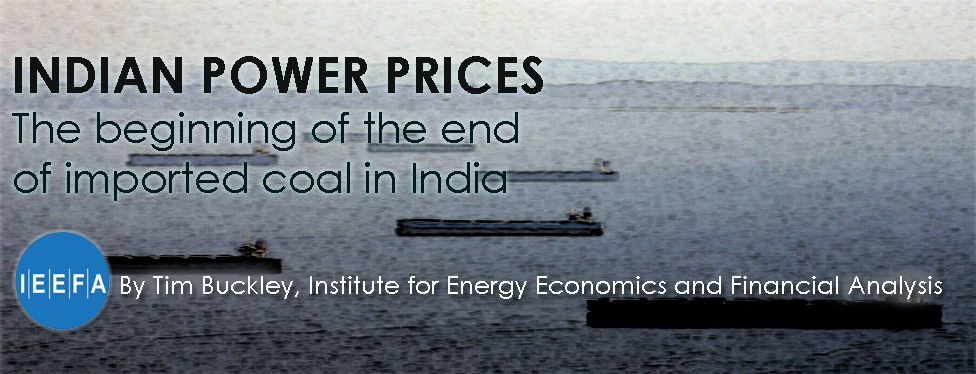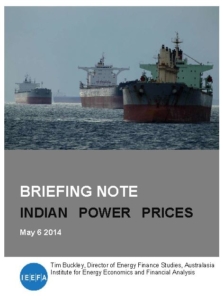Press release – The beginning of the end of imported coal in India: report exposes economic flaws

WASHINGTON 5 May, 2014: International coal projects relying on new import markets such as India face major financial risks, according to a new report from the Institute for Energy Economics and Financial Analysis (IEEFA).
As Chinese coal demand growth continues to slow, attention is increasingly turning to India. This groundbreaking new report uses in-depth financial modelling to evaluate the prospect of India as the next big coal import market. The results demonstrate the fundamental financial problems facing the coal and coal-fired generation sector in India are made materially worse when imported coal is used.
“This report is a wake up call to global investors and industry, establishing the uneconomic basis of international coal projects which rely on India as a potential growth market,” Tim Buckley, Director of Energy Finance Studies, Australasia for IEEFA said.
Key findings of the report include:
- Coal imported to India from the Galilee Basin in Australia would need a wholesale electricity price double India’s current level to be viable, categorically discrediting the argument that it might alleviate India’s energy poverty.
- A key difference between coal fired power generation and renewable energy is the issue of inflation: fossil fuels are inflationary while renewables are deflationary.
- The cost of electricity generation from solar in India has fallen 65% in the last 3 years alone and double-digit declines are forecast to continue.
- The financial modeling demonstrates that renewables not only start out cheaper than building new imported coal power capacity, but also get cheaper over time.
- In contrast, the average price escalation for imported coal in India equates to 4% pa in Rupee terms because it requires purchasing this US$ denominated fuel.
“India’s perilous economic and financial situation creates further uncertainty for companies relying on its ability and willingness to import coal, with its associated implications for inflation, current account deficits, economic instability and energy security.” Mr Buckley said. “The good news is that renewables are increasingly affordable and effective: wind, solar and hydro can be built faster and cheaper, in addition to acting as a deflationary driver in the economy.”
The report found that imported coal would require double the current price of India’s wholesale electricity, which categorically discredits the nonsense argument that it might alleviate India’s energy poverty.
“India’s economic and financial situation creates further uncertainty for companies relying on its ability and willingness to import coal, with negative implications for India’s inflation, current account deficit and economic instability,” Mr. Buckley commented, “A greater reliance on imported coal undermines India’s national energy security position and weakens its push for greater energy sector diversity.
“The global coal industry’s economic models are flawed, the world’s poor won’t be helped and the demand that is used to justify ruining the environment is an illusion. Savvy operators are getting out of coal.”
The report contributes to mounting industry unease about the financial viability of Australian export coal. In September 2011 Gina Rinehart sold most of her coal assets in Queensland’s Galilee Basin to Indian company, GVK.
Tim Buckley is the Director of Energy Finance Studies, Australasia for the Institute for Energy Economics and Financial Analysis. He has 25 years of financial markets experience, including 17 years with Citigroup culminating in his role as Managing Director and Head of Australasian Equity Research.
Mr Buckley has spent the past five years investigating the trends in global renewable energy and as a result questions viability of the Galilee developments.
Tim has produced detailed reports on both GVK and Adani. https://ieefa.org/category/reports/
Mr Buckley is available for interview. Copies of the report can be found at the IEEFA website here or upon request.
Media enquiries: Alison Martin P: 0432 941 533
U.S. media: David Neustadt, P: 917 671 6576













